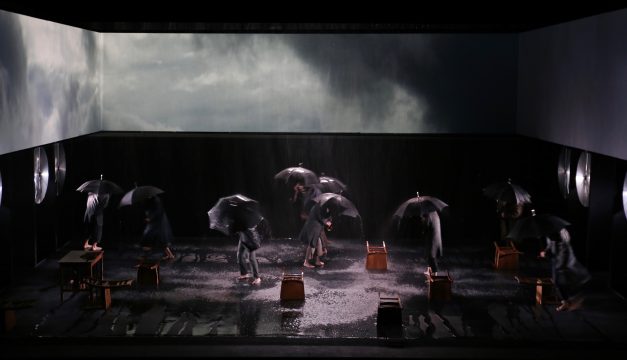THEATER REVIEW: Water, Water, Everywhere in When the Rain Stops Falling

When the Rain Stops Falling at the Wilma Theater. (Photo by Matt Saunders)
It’s coming down in buckets at the Wilma Theater. The onstage downpour that begins and intermittently continues through Andrew Bovell’s When the Rain Stops Falling is so torrential that the ensemble cast, clad in black raincoats and holding black umbrellas, barely stands a chance. Did I mention the set is also mostly black? If it sounds grim — well, it is, very. Also strangely beautiful. But it almost certainly signals the end of the times.
Theatrically speaking, that’s the good news.
Blanka Zizka is a director of startling originality and visual imagination, and those qualities are fully on display here. But though she is clearly the guiding force, it isn’t only Zizka’s show. Her superb design team (scenery and projections by Matt Saunders, lighting by Yi Zhao, sound by Christopher Colucci) provide an astonishing, immersive experience. They, as much as the cast and playwright, are the stars here.
I mean no disrespect to Bovell’s play, a family saga about actions and repercussions that covers 60 years and extends into a nightmarish near-future. When the Rain Stops Falling is a series of fragmentary scenes, each of which is intriguing but challenging to parse. For the viewer, it’s like a jigsaw puzzle where the picture only becomes clear after much of it is assembled. It’s not a pretty picture — and Bovell sometimes descends into lugubrious melodrama — but it’s a powerful and poetic one, having to do with the imprint of individual mistakes that resonate for decades. (By the way, When the Rain Stops Falling is not fundamentally a treatise on climate change. Bovell uses references to weather largely as Shakespeare does with the storm scene in King Lear — they are a metaphoric mirror for emotional turbulence.)
Ultimately, though, I’m not sure Zizka’s production serves Bovell’s play very well. Its two-plus intermission-less hours are filled with talk that here is often taken at a snail’s pace. Movement is slower still, sometimes suggesting the quality of a ritual. There’s little action within a scene — characters remain more or less planted in often deliberately awkward configurations. The images are striking, but although the fine team of nine actors all score individual points — especially Keith Conallen, Steven Rishard, and Taysha Marie Canales, and Sarah Gliko — it’s difficult to overcome the enveloping sense of artifice.
I’m sure some audiences will find the Wilma’s When the Rain Stops Falling transfixing, even transformative. I did too, in parts. But it’s telling that the moments which registered most are the silent ones — scene shifts, entrances and exits, tableaux.
When the rain stops falling — and characters start talking — it can be a bit of letdown.
When the Rain Stops Falling runs through November 6. For more information, visit the Wilma Theater website.


